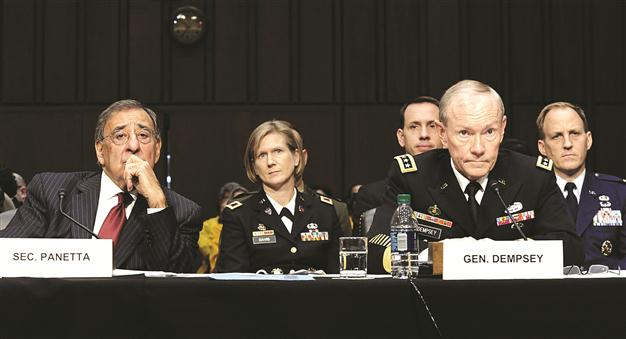Panetta defends pullout from ‘independent’ Iraq
WASHINGTON

US Secretary of Defense Leon Panetta (L) and Chairman, Joint Chiefs of Staff Gen. Martin E. Dempsey (R) testify at a hearing of the Senate Armed Services Committee on Nov 15 on Capitol Hill in Washington, DC. The committee conducted hearings on security issues relating to Iraq, and Panetta defended US decision to withdraw. AFP photo
U.S. Defense Secretary Leon Panetta rejected accusations at a heated Senate hearing Nov. 15 that U.S. politics helped drive the decision to completely withdraw from Iraq this year, without leaving any troops behind as trainers.Responding to Senator John McCain’s criticisms that Obama failed to make a sincere effort to broker a deal with Baghdad to keep some U.S. troops in place, Panetta said: “This is about negotiating with a sovereign country, an independent country. This was about their needs. This is not about us telling them what we’re going to do for them or what they’re going to have to do.”
Panetta voiced frustration with McCain’s portrayal, saying Baghdad was not prepared to grant legal immunity to U.S. forces and the United States could not simply decide what it wanted in Iraq eight years after the U.S. invasion. Although the Iraqi government was ready to adopt legal protections for U.S. troops, U.S. officials wanted the country’s parliament to ratify the safeguards but that proved too difficult, Panetta said. “I was not about to have our troops go there without those immunities,” he said. Panetta added he was confident Iraq could manage its security and counter Iran’s influence. Baghdad’s political leaders “basically reject what Iran’s trying to do,” he said.
The U.S. military’s top officer, Gen. Martin Dempsey, told lawmakers he was concerned about the future of Iraq after the pullout and acknowledged that no commander had recommended a full withdrawal. But he agreed that American forces could not operate without legal protections. “In anticipation of the question about whether I’m concerned about the future of Iraq, the answer is yes,” said Dempsey, citing Arab-Kurd tensions in the north.
Concerns on Iran’s meddling
The general said “this isn’t a divorce” and that the U.S. would maintain a role advising the Iraqi army, including counter-terrorism training “inside the wire” at camps for Baghdad’s special forces. Panetta also left the door open to a future U.S. military presence if requested by Baghdad, an apparent contradiction of previous White House statements. “We’re prepared to continue to negotiate with the Iraqis. We’re prepared to try to meet whatever needs they have,” he said.
Dempsey echoed Panetta’s remarks. He told a Senate Armed Services Committee hearing he thought the U.S. should rotate ground, naval and air forces through Kuwait. He said the issue had not been negotiated with Kuwait. Senator Joseph Lieberman asked Defense Secretary Leon Panetta and Dempsey whether the Pentagon was considering boosting U.S. troop levels in Kuwait since it had to withdraw American forces from Iraq. “I wouldn’t describe it as a cause-and-effect relationship based on what happened in Iraq, but rather our continuing concern with a more assertive Iran,” Dempsey replied.
The United States has nearly 29,000 troops in Kuwait, Panetta told the committee. He said there were nearly 7,000 U.S. troops in Bahrain, 7,000 in Qatar, 3,000 in the United Arab Emirates and 258 in Saudi Arabia.
Compiled from Reuters and AFP stories by the Daily News staff.
















